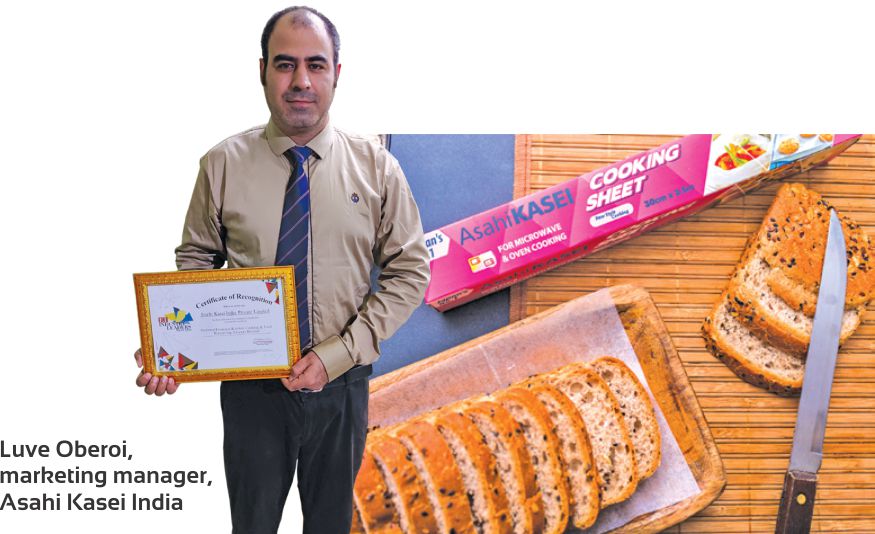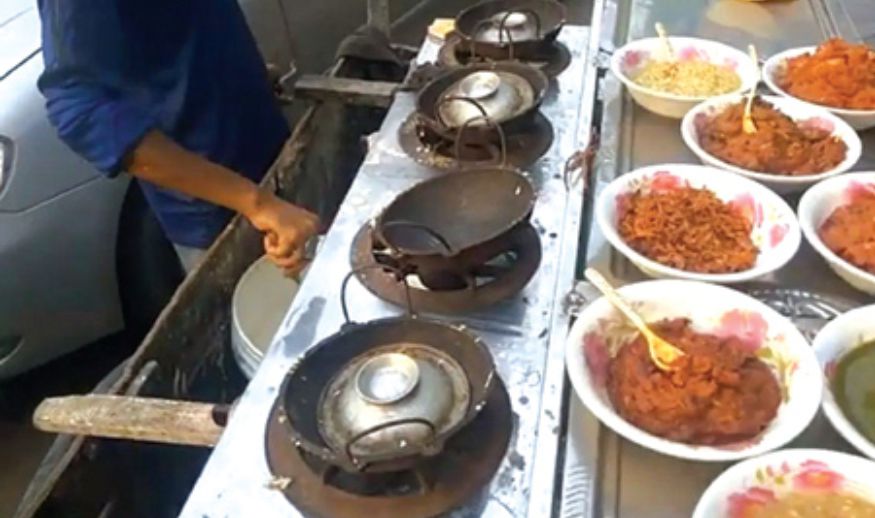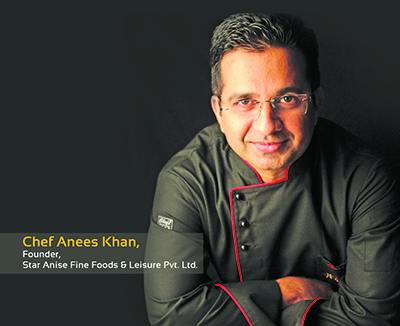BakeryBiz, Jan-Feb, 2020:

Bakery industry in India, with an average annual growth rate in retail consumer sales of about 5.5 per cent was valued at US$ 7.22 billion in 2018. In the current scenario, today India ranks second in the world in production of food, with bakery commanding as one of the principal segments. While Global bakery market size is expected to reach US$ 591 billion by 2024, according to an estimate, the Indian bakery market is projected to reach US$ 12 billion growing at a CAGR (compounded annual growth rate) of 9.3 per cent during 2019 and 2024. (Source – imarc)
The industry features more than 2,000 bakeries in the organised segment and over a million in the unorganised category. Involvement of big business houses in setting up bakery chains has boosted the growth of the segment. Its continued growth can be attributed to the factor of busy lifestyle, surge in consumer spending on food products, changing eating habits and western influence – congregating into convenience. With increased consumer consciousness, movement towards healthy eating habits is also being seen as one of the greatest influencers of the Indian bakery products industry.
Bakery products have been rapidly gaining popularity owing to their pleasant taste and health benefits as they are made from variety of grains such as rye, maize, wheat, and oats amongst others. While breads and biscuits (forming a part of FMCG products group) are consumed on a daily basis, increasing the sale of these products, growth in the fast-food segment has further stimulated the demand for breads. Rise in demand for cakes and other bakery products in household celebrations and introduction of value-added bakery products has also given an impetus to the market growth.

The Pune Bakery Fare
The recent past has seen Pune develop as a mature, thriving and attractive market for the hospitality and food service industry. In line with that, the bakery segment has also seen a substantial growth with mushrooming of various bakeries across segments throughout the city – both in the organised and the unorganised segments.
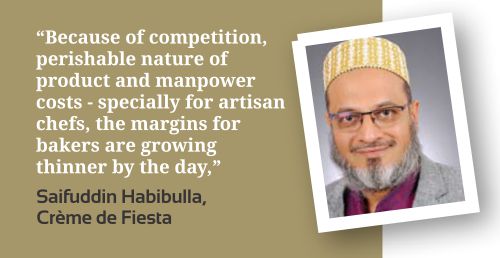
Saifuddin Habibulla of Crème de Fiesta, opines that the cake shop side of the industry has grown tremendously in the Pune market over the last few years. His 32-year-old organisation, manufacturing over 250 bakery products, both fresh and industrial, suppliers fresh products to about 50 cake shops in Pune as well as their packed products in select markets in India and the overseas markets of UAE, Africa, Singapore, among others.
“Standalone shops have mushroomed in different parts of the city. One of the primary reasons why the bakery market has seen such growth is because of a slump in business for the other industries, thus diverting people towards food. Food is a cash and carry business and something that everybody needs and operates on impulse buying. In addition, the hype around birthdays and celebrations and the trend of showing their celebrations on social media has also given a boost to the fresh bakery business,” said Saifuddin.
Unlike before, today there are more than 20 bakery chains operating multiple shops in Pune. This, in addition to the exceptionally large number of standalone cake shops, directly reflects that the cake industry in Pune is growing. However, with large number of stores comes bigger competition and other associated business challenges.
“The bakery scenario in Pune is massive. Pune would rank among the leading cities for bakery business in India. However, with more than 3,000 bakeries including 20 bakery chains present, the market is saturated,” informed Mandar Bhosale, a certified chocolate taster who is also the founding member of International Chocolate Research and Innovation Council (ICRIC) and is associated with Cacao Solutions and Zelos Food Products. “One of the reasons for this growth could be attributed to the presence of large numbers of young crowd in Pune – primarily coming from more than 200 colleges and the large number of IT companies based in Pune,” he added.
Talking about the bakery scenario in Pune, Sharan Shetty, President Poona Hoteliers Association and Managing Director, Hotel Shree Panchratna, Pune said, “things are changing for the better. It is good to see so many bakeries open. It is great to see so many people get into this industry. However, there is definitely a concern of sustenance for them because with an increase in the number of operators, there is bound to be a demand and supply imbalance. I believe that there is a lots more to be seen in the bakery segment in times to come.”
“Shops have been seen giving major discounts, especially around high business season time with offers of buy 1 get 1, deep discounting in the pricing of cakes, etc. This trend was unheard of in the past. While such measures have increased the volume of business for some, the margins have gone on depleting. Because of competition, perishable nature of product and manpower costs – specially for artisan chefs, the margins for bakers are growing thinner by the day,” informed Saifuddin.
On the industrial baking side, there is not much margin, but the turnover and volumes are high. While the business side of it is going strong, very few bakers are able to get into it in a big way. The reasons are that of higher costs involved with regards to packaging, distribution and limited shelf life of the products, making the margins thinner. “Though there is growth, I think the growth is with lesser margins than before,” Saifuddin reiterated.
“While Pune has a lot of local bakeries, typically the older ones, which are continuing to do well, they are mostly low-cost bakeries and not the high-end ones. One of the primary reasons for their continued success is that Pune market is very price conscious and perhaps that is the reason that the market acceptability for artisan bakeries is comparatively limited. While awareness about bakery products has gone up and there is a market for artisan bakeries, there is still a lot of growth prospect in that space,” added Sharan Shetty.
In the recent past, the rates of fats (vegetable fats and oils) and flour have increased considerably, yet many bakers have not been able to increase their rates – primarily owing to the market situation. Use of low grade ingredients is harmful as the final product has more saturated fats and is full of trans-fats. Products made using low trans-fat ingredients is safe for consumption. In the developed markets, due to increased awareness, products with trans-fat content is not consumed. There needs to be increased awareness amongst customers to make a healthier choice.
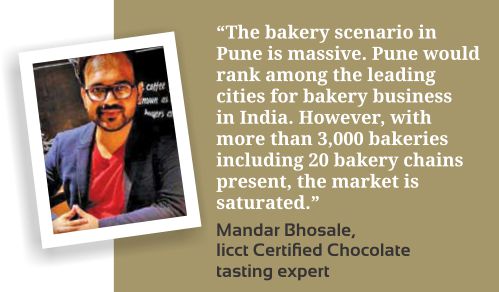
Because of the presence of such large numbers of bakeries, Mandar believes, that there is extreme competition and also compromise in the quality of bakery products is happening at a very large scale. “It is the reason of this competition that a vanilla pastry is being made available for as low as Rs 10 and chocolate for Rs 20. Now at this price, the quality would have to be questionable. Pure chocolate cannot be used and the substitute of compound is being widely served as chocolate. It is unfortunate that the customer is not made aware of what they are consuming. I have been conducting sessions to increase awareness about using the right chocolate ingredient among bakers, students, chefs, and influencers, among many others,” he opined.
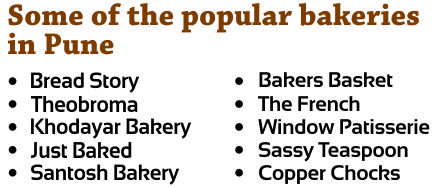
People are happier with buying products which have a smaller selling price. This has resulted in growth of cheaper quality products which use low quality ingredients that is not good for health.
Historical Trail
Conventionally, Puneri people have always favoured their local bakery. Owing to its rich cultural heritage, one can also find a number of Irani and Parsi bakeries in the by lanes of the city. Some of these popular bakeries have withstood the pressures of time and even today stand tall amongst the top bakeries in the city. At most times their products run out of stock within hours of baking. We list a few of the popular historic bakeries of the city:
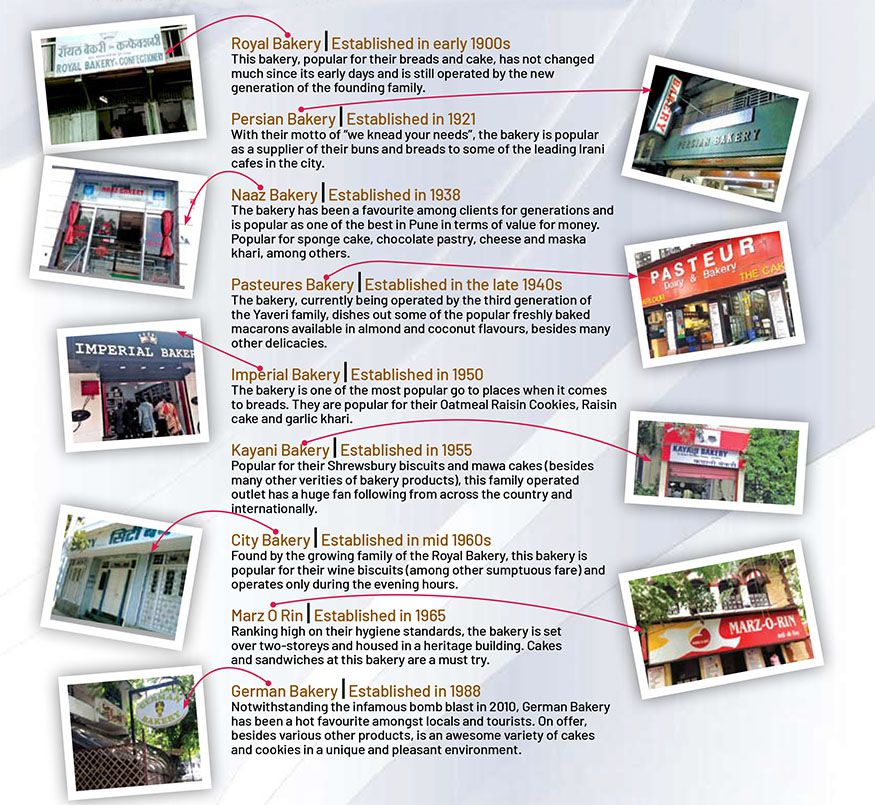
Chef Rajiv Janveja Corporate Chef, Lemon Tree Hotels
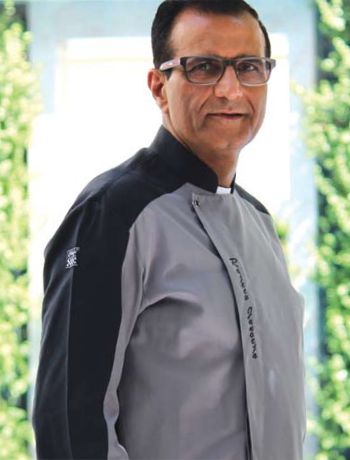
Bread has become an integral part of Modern Living and Dining. Western India is rated as the biggest consumer of bakery produce in the country. Pune having a long-standing reputation for being home to some of the best Irani and Parsi bakeries in the country plays a vital role in getting this rating for the region.
With changing lifestyles, influx of people from all across the country to Pune, growth of fast-food culture and increasing concern over health, the bakery facilities here are growing by leaps and bounds making it a Mecca for artisan breads and baked specialties.
From the classic broon in all the Irani cafes all across Pune, shrews berry biscuits of Kayani Bakery, the milk bread of Royal bakery to the presently trending innovations in vegan, health conscious, organic offerings, Pune has it all.
The above bakeries being well known for their classics are now adapting and have innovatively expanded their scope to health conscious and vegan options like the usage of corn, sorghum, buckwheat which are far healthier and flavourful. These efforts have brought Pune to the stature of being considered a heaven for baked goods.
One of the other challenges faced by the bakery segment is the factor of taxation. Fresh bakery products (except for toast) attract 18 per cent tax. This also has to be taken into consideration to ensure that the business becomes viable. As part of the bakery industry, an initiative has to be taken.
“There is a group of bakers with pan India representation associated with AIBPM Institute in Delhi, which is trying to promote zero trans-fat products. Such products though are a little more expensive, but definitely are much healthier,” informed Saifuddin.
It is unfortunate that the mushrooming growth of the bakery industry in Pune is not translating either into better and wider range of quality products, not into increased margins for the bakers, expressed Saifuddin. Packaging is playing a far more important role than the quality of product inside. Due to the lack of customer awareness, a lot of players are compromising on the quality of their products and relying on their attractive packaging.
The lack of expertise, ever growing prices of raw materials, competitive pricing, lack of proper infrastructure, are a few impediments which are faced all across this industry. Frozen ready to bake bakery products come as an answer in a way which is pricey but assures quality and consistency in products with limitations in offerings. However, the catering establishments, in their urge to be in top of the F&B scenario, have always been constantly innovating in healthier/cost effective ways to bring a pleasant change and this will continue to highlight Pune to everyone as the Baker’s paradise of the west.
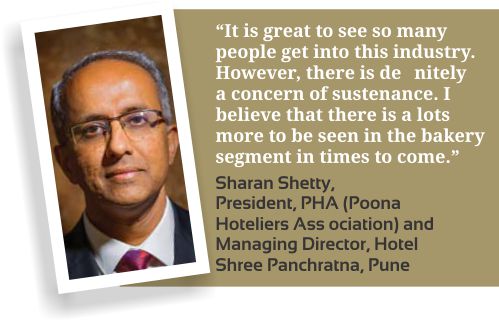
Chef Ajay Chopra
TV Show Host, Entrepreneur, Consultant

Pune, the lazy cousin of Mumbai, has been known for its old school cookies, Iranian style bakeries and wood fired breads and fruit cakes. Many good bakeries serve good bakes, artisan viennoiserie, gourmet pastries and some great breads.
The city is slowly catching up with international trends, use of heritage grains are in vogue, old school style comfort pastries are back, gluten free breads, sour dough, sugar free options are trending nowadays.
One of the biggest challenges faced is about the lack of awareness among the talent available in the main stream. Also, the ingredients are very expensive and there is lack of appreciation of good quality products in the market.
Chef Anirban Dasgupta
Executive Chef, Hyatt Regency Pune

The market for baked goods is now leading above all ready-to-eat food segments. The major categories – breads cakes and biscuits have been growing significantly. With the advent of modernization of this sector Pune’s market has seen a high with bigwigs like Theobroma, Le Flamington booming in the market. The five-stars have although taken a route to better their breads and Sour dough is one of the key aspect to breaking into the Pune market. Zeta at the Hyatt regency Pune does Sour dough for all their breads and Pizzas.
The cakes and pastries has seen significant growth over the years in Pune market. Special designer cakes are no more a five-star hotel affair as it is easily available by passionate home makers doing it at half the price.
As far as the challenge is concern, procurement of quality ingredients is a major challenge. Not Just this, finding skilled able craftsmen in the field are a rare phenomenon.
Challenges faced by the Indian bakery industry
Maintaining standards – in line with the rules laid down by the competent authority. This is typically true in case of the small bakers in the unorganised sector who do not pay much attention to hygiene and ingredients being used in creating attractive looking bakery products.
Many standalone bakeries and small bakers are flouting the rule of displaying the content and nutritional values of products on packaging. This has been seen as they work on thin margins and their set-up does not permit them to invest in these products.
Trans fat has been seen as an evil and has been almost totally banned in the western countries. However, an awareness towards that is yet to set in
to the Indian bakery segment.
Fluctuating price of raw material – The price of ingredients used in bakery products (primarily flour) has been continuously fluctuating thereby having an impact on the price of the end product. Unfortunately, keeping their customer demands and pocket size in mind, bakery owners cannot keep altering the price of their products on a regular basis, as often as the ingredient price is altered.
Limited shelf life – Shelf life of bakery products is limited, thereby making the produce perishable.
Rising cost of operational functionality – An increase in overall cost of living has resulted in increase in the various cost aspects of operating and running a bakery. Limited scope for errors gives limited chance for innovation and improvement in the product availability from small and medium bakers.



